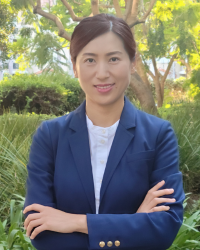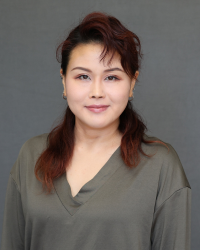The Reischauer Institute Postdoctoral Fellowships in Japanese Studies provide recent graduates with the opportunity to continue their doctoral research at Harvard and produce publishable work from their dissertations. The fellows participate in the Japanese studies community at Harvard, work with faculty and students, and present their research in the Japan Forum lecture series at some point during their stay.
The RIJS Postdoctoral Fellows for the 2025-26 academic year are as follows:
-
FREDERICK FEILDEN (Early Modern Japanese Literature, University of Cambridge, 2025)
-

Dr. Frederick Feilden is a scholar of early-modern Japanese literature, specializing in the long-term development of the genre of graphic narratives known as kusazōshi. He earned his Ph.D. in Asian and Middle Eastern Studies, conducted under the supervision of Professor Laura Moretti, from the University of Cambridge in June 2025.
Dr. Feilden’s dissertation, “Strategies of Adaptation: Constructing Gōkan in Late-Edo Japan,” focuses on the structural principles that shaped (and reshaped) the production and consumption of the final stage of kusazōshi: the lavishly-illustrated woodblock-printed books known as gōkan. Across three detailed case studies, the thesis further nuances our understanding of this underappreciated genre, while demonstrating the value of facilitating an ongoing and critical dialogue between early-modern and present-day conceptualizations of textual change. At the heart of this effort is a new working model, an “architectonics” of adaptation, which connects together the rhetoric and techniques of constructing gōkan with the wider socio-cultural conditions that allowed those strategies to flourish with conspicuous freedom in the first place.
At the Reischauer Institute, Dr. Feilden will set about revising and expanding his thesis for publication as a monograph. A new branch of his research considers how gōkan were implicated in—and affected by—the changes to adaptation discourse through the Bakumatsu and early-Meiji periods, paying particular attention to the shifting horizons of authorship and readership as “modern literature” and intellectual property became increasingly intertwined and institutionalized towards the close of the nineteenth century.
-
DEANNA T. NARDY (Japanese Literature and Media, Columbia University, 2025)
-

A specialist in modern Japanese literature and visual media, Dr. Deanna T. Nardy earned her Ph.D. in East Asian Languages and Cultures from Columbia University in 2025.
Her dissertation, “Countervisions of Postwar Japan,” presents three examples of cultural practices that, through their engagement with questions of sociality and relation, challenge normative postwar narratives of a healthy economic, political, and social body. These examples span three mediums from the 1950s to 1980s: the translation of Anglophone black literature, kashihon (rental) manga, and the photography of Okinawa-born Ishikawa Mao. Thinking through Japanese translators’ efforts to frame black literature, kashihon manga and the violent aesthetics of gekiga, and Ishikawa Mao’s camera reworking vision and its relation to race, “Countervisions of Postwar Japan” explores three possible modes of defining the human sought by those desiring to be bound neither by the binary of the Cold War nor the entrenched imperial logics of race and nation.
At the Reischauer Institute, Dr. Nardy will work on revising her dissertation into a book manuscript.
-
DUNCAN REEHL (Ethnomusicology, Boston University, 2024)
-

Dr. Duncan Reehl earned his Ph.D in Ethnomusicology from Boston University in August 2024. Before joining the Reischauer Institute as a Postdoctoral Fellow, he served for one year as a Lecturer in the School of Music at Boston University, where he taught courses on music in Asia, music, media, and technology, experimental music, and more.
His dissertation, “Sound Sutures: Buddhism, Music, and Religiosity in Contemporary Japan,” examines how sound and music practices attune individuals and communities to Buddhist teachings amid demographic decline and institutional crisis. Grounded in ethnographic fieldwork conducted in rural Kyushu with a 16th-generation New Pure Land priest who is also a DJ and music producer, it explores case studies of sutra recitation and everyday soundings of Buddhism; mediatized musical arrangements of the Heart Sutra; Buddhist praise songs; and the usage of the shakuhachi flute as a Buddhist ritual implement. The dissertation addresses a gap in ethnomusicological literature on religious sound in everyday life in contemporary Japan, demonstrating how technological modernity inflects religious experience. It further shows how sound and music technologies, embedded in overlapping technical systems, provide tools to navigate institutional crisis and afford religious continuity across shifting institutional conditions—subverting, complicating, and at times reinforcing culturally and historically sedimented binaries such as East/West, tradition/modernity, and sacred/profane.
At the Reischauer Institute, Dr. Reehl will revise his dissertation into a book manuscript and develop a digital archive of mediated Buddhist sound and music practices, with an initial focus on Japan. He will also continue a new ethnographic and historical research project exploring the entanglement of Buddhistic sound with “New Age” spirituality, techno-salvationism, and local and transnational marketplaces for healing and spiritual commodities.
-
QIAOYAN LI ROSENBERG (Sociology, University of California, Los Angeles, 2025)
-

Dr. Qiaoyan Li Rosenberg specializes in Japan’s labor migration programs in terms of program design, reform, implementation, and migrant workers’ mobility and well-being. She earned her Ph.D. from the Department of Sociology at the University of California, Los Angeles, in 2025. She completed her dissertation fieldwork with the Fulbright-Hays Doctoral Dissertation Research Abroad fellowship at Waseda University (2022-2023).
Her dissertation, “Labor Migration Programs in Japan: A Three-Step Pathway to Permanent Residence, but Precarious Labor for All,” examines the design and implementation of two labor migration programs in Japan: the Technical Intern Training Program (TITP), and the Specified Skilled Worker (SSW) program. Drawing on empirical data from extensive fieldwork in Japan, she demonstrates, on the one hand, how the two programs create a skill-based pathway to expand migrant workers’ freedom and rights and permit their permanent settlement, and on the other hand, how the freedom to change employers and other rights are difficult to obtain on the ground, and how workers’ precarities persist through the two programs. The dissertation unravels the complex dynamics between public and private governance over labor mobility. By illustrating the substantial discrepancies between intentions and outcomes of policy reforms, it points to major challenges to liberalizing guest worker programs.
At the Reischauer Institute, Dr. Rosenberg will be preparing to expand her dissertation into a book manuscript. She will also begin a new research project to examine the role of Japanese labor unions in resolving migrant labor disputes and alleviating labor precarity, and develop it into a journal article.
-
AOI SAITO (Modern Japanese History, Northwestern University, 2025)
-

Dr. Aoi Saito is a cultural and social historian specializing in modern Japanese history, with a particular focus on gender and sexuality. Her expertise also extends to teaching and researching East Asia, the Pacific, and global exchanges. Before pursuing history, she worked as a geisha apprentice (maiko) and as a Japanese language teacher, while training in traditional Japanese singing and dance. Drawing on this interdisciplinary background, she employs mixed methods, including song analysis, oral history, and linguistic analysis of oral interviews.
Her dissertation, “Contesting Welfare in Red-Light Districts: Women’s Networks, Self-Protection, and Public Health in Japan, 1925-1965,” explores the lives, ideas, and actions of women in Tokyo’s sex trade. Shifting the existing scholarly focus from these women’s interactions with male clients and employers, her work emphasizes the significance of their peer networks. It demonstrates how these women collectively navigated legal challenges and social stigma, asserted their capacity for self-sufficiency, extended their networks with various interest groups, and ultimately influenced state welfare policies. Her research argues that policymaking in modern Japan was not solely driven by officials and reformers but was also shaped by the bottom-up movements of marginalized women.
At the Reischauer Institute, Dr. Saito will prepare her dissertation for publication as a book manuscript. As a preliminary phase of her next project, she will also study the networks and movement of Japanese and Okinawan women in military brothels across the wartime Pacific, examining how they used personal connections and mobility to survive amidst global conflict.